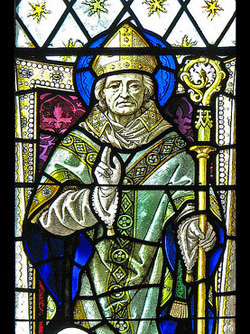Saint of the Day Online - St Hugh of Lincoln
Saint of the day online, Friday, November 17, 2017
17-11-2017
Saint Name: St Hugh of Lincoln
Place: Holy Roman Empire
Birth: 1135
Death: 1200
Feast: November 15
St Hugh of Lincoln who was born on 1135 is also known as Hugh of Avalon, was a French noble, Benedictine and Carthusian monk, bishop of Lincoln in the Kingdom of England, and Catholic saint. At the time of the Reformation, he was the best-known English saint after Thomas Becket. His feast is observed by Catholics on 16 November and by Anglicans on 17 November.
At the age of fifteen, Hugh became a religious novice and was ordained a deacon at the age of nineteen. About 1159, he was sent to be prior of the nearby monastery at Saint-Maximin, presumably already a priest. From that community, he left the Benedictine Order and entered the Grande Chartreuse,[1] then at the height of its reputation for the rigid austerity of its rules and the earnest piety of its members. There he rose to become procurator of his new Order, in which office he served until he was sent in 1179 to become prior of the Witham Charterhouse in Somerset, the first Carthusian house in England.
Henry II of England, as part of his penance for the murder of Thomas Becket, in lieu of going on crusade as he had promised in his first remorse, had established a Carthusian charterhouse some time before, which was settled by monks brought from the Grande Chartreuse. There were difficulties in advancing the building works, however, and the first prior was retired and a second soon died. It was by the special request of the English king that St. Hugh, whose fame had reached him through one of the nobles of Maurienne, was made prior.
Hugh found the monks in great straits, living in log huts and with no plans yet advanced for the more permanent monastery building. Hugh interceded with the king for royal patronage and at last, probably on 6 January 1182, Henry issued a charter of foundation and endowment for Witham Charterhouse. His first attention was given to the building of the Charterhouse. He prepared his plans and submitted them for royal approbation, exacting full compensation from the king for any tenants on the royal estate who would have to be evicted to make room for the building.[3] Hugh presided over the new house till 1186 and attracted many to the hermitage. Among the frequent visitors was King Henry, for the charterhouse lay near the borders of the king's chase in Selwood Forest, a favourite hunting ground. Hugh admonished Henry for keeping dioceses vacant in order to keep their income for the royal chancellery.
He was one of the leaders in denouncing the persecution of the Jews that swept England, 1190-91, repeatedly facing down armed mobs and making them release their victims. He went on a diplomatic mission to France for King John in 1199, visiting the Grande Chartreuse, Cluny, and Citeaux, and returned from the trip in poor health. A few months later, while attending a national council in London, he was stricken and died two months later at the Old Temple in London on November 16. He was canonized twenty years later, in 1220, the first Carthusian to be so honored.